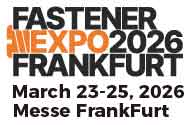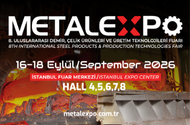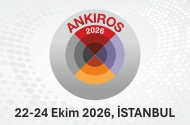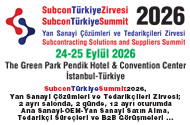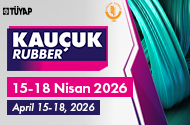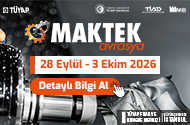Konveyor Manufactures for White Goods in 9 Factories
Konveyor Board President Hasan Basri Aksu has informed us about Konveyor`s development process since the establishment, besides the company`s future goals.
Konveyor Manufactures for White Goods in 9 Factories
Konveyor Board President Hasan Basri Aksu has informed us about Konveyor's development process since the establishment, besides the company's future goals.
Konveyor is set to continue its activities across 6 plants (5 in Turkey and 1 in Poland), 9 factories and over 100.000 square metres of production space; with a workforce of over 2500 people. Upon completing their new Manisa factory investment in 2019, Konveyor is continuing with its investment in Eskişehir as of 2021. Konveyor Board President Hasan Basri Aksu has explained Konveyor's development since the establishment, besides the company's future goals.
Home Appliances Turkey Suppliers Magazine: Could you give us information about the history of Konveyor?
Hasan Basri Aksu: The first Konveyor Ind. Co. Ltd., whose name is kept by our current companies, was established in 1979 as the 3rd company of a modest a supplier group of 2 companies to manufacture turnkey conveyor systems for factories (in fact, our company logo, which is still in use today, is a stylized version of an aerial conveyor chain link). Hasan Basri Aksu was a junior partner in the establishment of this new company, in which the owners of the aforementioned company group were in the majority. In 1981, besides the conveyor business, our company took the first step into becoming a supplier with the start of the production of combustible burner heads for gas stoves and ovens.
The partnership structure of our company, which continued with the partnership structure and field of activity described above until the end of 1987, changed as of the beginning of 1988; thus, the company came under the rule of Aksu family, with the acquisition of shares from other partners. Later, the company focused on the supplier business, and the non-continuous conveyor business was terminated in 1994; thus, our company turned into a white goods supplier company. Therefore, it can be said that Konveyor in today's sense was founded in 1988.
(Detailed information is available on our website. www.konveyor.com )
Home Appliances Turkey Suppliers Magazine: How many locations do you currently produce in? What products are manufactured in which factory?
Hasan Basri Aksu: Between 1988 and 1997, the period of establishment and infancy, our company continued its activities in 3 facilities in Kartal and 1 in Eskisehir in a total rented area of 2300 square meters (1000+700+300 in Kartal and 300 in Eskisehir). In 1997, the company moved to its own factory buildings built in Eskisehir OIZ and Tuzla Leather OIZ. During those years, the company structure was changed to a "joint stock company" (1995), and we started exporting via the international fairs, which we started to participate in under the umbrella of BEYSAD (1995-2000).
In the following years, in parallel with the rapid growth of the white goods manufacturers, our company continued to grow, as well. Today, it has reached a structure with 6 plants (5 in our country and 1 in Poland), 9 factories, a production area of more than 100,000 square meters and over 2500 employees. These plants and production areas can be summarized as follows (in order of establishment dates with the “original” record for production specific to that plant only):
Aydinli Plant: 2 factories with an area of 8000 + 2000 square meters located in Tuzla Leather OIZ; Air Conditioner, Domestic Heaters, Heat Pump (original), Drier Tubes, Refrigerator Heat Exchangers, Drier (original) and Capillary Tubes (original), generally produced from copper tubes of various sizes,
Eskisehir Plant: 1 factory with an area of 12000 square meters in Eskisehir OIZ; WOT (factory-specific) and POT Evaporators, NF Evaporator Grouping, Refrigerator Heat Exchangers and various copper service tubes,
Manisa Plant: 2 factories with an area of 25000 + 8000 square meters in Manisa OIZ, the 2nd one is still empty; Air Conditioning Tubes, Air Conditioning Installation Kit, NF Evaporator Grouping, POT Evaporators, Refrigerator Heat Exchangers, various copper service tubes and Oven Main Gas Distribution tubes (original),
Free Zone Plant: 1 factory with an area of 26000 square meters where our 2nd company, which was established with Konveyor Co. Ltd. Corporate Body in Tuzla DESBAŞ Free Zone in 2003, operates; NF Evaporators and Groupings, Refrigerator Heat Exchangers and various service pipes, Furnace Gas Transfer Pipes, Aluminium Pipe production (factory specific), R & D Center (factory-specific),
Orhanli Plant: 1 factory with an area of 8000 square meters in Tuzla Leather OIZ; NF Evaporators and Groupings, Refrigerator Heat Exchangers and copper service tubes, Furnace Gas Transfer Pipes, Air Conditioning Installation Kit and Automotive Air Conditioner Tubes (factory-specific),
Konveyor Polska Plant: 2 factories with an area of 5000 + 5000 square meters, purchased in 2018 and located in Kalisz, Poland… POT Evaporators, Refrigerator Heat Exchangers and various service tubes, Drier Tubes, NF Evaporator Grouping, Refrigerator Environment Heater Tubes (Door Warmers, factory-specific)…
As seen, components other than some factory-specific items are produced in more than one facility. While there is an annual production of hundreds of different components, sometimes exceeding millions, it does not seem practical to mention the "pieces on an annual basis".
Konveyor Prepares for a New Investment in Eskisehir following the Investment in Manisa Factory
Home Appliances Turkey Suppliers Magazine: Could you give information about your new investment in Manisa factory in 2019? Have you made any other investments?
Hasan Basri Aksu: Our previous factory, which was 8000 square meters with mezzanines in Manisa, became insufficient for our production capacity in time due to the increasing production volumes of our existing customers and our new Far East-Asian Air-conditioner manufacturer customer investing in Manisa; this is why, moving to a larger building became inevitable for us. We quickly embarked on the project by purchasing one of the last parcels of 32 thousand square meters in the Manisa OIZ portfolio. It was a great chance for us that our construction, which started at the beginning of 2019, was completed in November 2019 and we moved in December, that is, right before the “pandemic”.
Our new factory has a total closed area of 25 thousand square meters, of which 4 thousand are administrative and 21 thousand are production areas. This is a pretty large space for today. However, whenever we built a new factory and said, "This will be enough for us for long years," the white goods production potential of our country has always misled us. This time, besides the expansion area in the new factory, we have decided to keep the old factory for a while. Although it has not been planned yet, we are currently trying to develop a project such as shifting some production from here to our old factory in Manisa for a possible space requirement in the Istanbul factories.
Since our Eskisehir factory started to sound the alarm in parallel with the development in Manisa, we took advantage of an opportunity in 2018 and purchased a 52 thousand square meters of land in Eskisehir OIZ. After the completion of the investment in Manisa, we are currently in the planning phase of the construction of a new factory in this new area, larger than our current building and measuring 25-26 thousand square meters. We aim to complete this building and move into it in 2021, if there is no obstacle in our construction.
Konveyor Exports 45% of Production
Home Appliances Turkey Suppliers Magazine: How much of your production do you export? What countries do you mainly export to? Do you have new target markets?
Hasan Basri Aksu: In fact, we should have reached the 50% target we had previously set for exports by 2020. However, the increase in business volumes of domestic customers in parallel with the increase in exports prevented us from achieving this target. In today's view, it seems that we need to wait until 2022 in order to reach the 50% target in our exports, which is at the level of 45%, unless there are unexpected increases in our domestic customers by that time.
We export 75-80% of our production to the EU countries, 10-12% to the North and South Americas, and 10-12% to Russia, Belarus and Ukraine.
We see new export potentials in North and South American countries, and try to benefit from these potentials. It seems that using this potential fully will require an investment in, for example, "Mexico" similar to the one in Poland, which is currently not a target in short-term.
Home Appliances Turkey Suppliers Magazine: 2020 has been a tough year due to the pandemic. How was 2020 for Konveyor? Have you achieved your goals?
Hasan Basri Aksu: Actually, while setting a target for 2020 towards the end of 2019, the pandemic was not in consideration. As known, the pandemic, which started to come to the fore in February 2020, had a very negative impact on both daily lives and industrial production, especially in March, April and May, with the lockdown. However, during the "new normal" process, which started from the beginning of June and continued until October, production in our company increased tremendously like in other companies, and the losses in the spring months were compensated. We used to perceive this as “compensation for the needs that were postponed”, but as December has started, this boom continues uninterruptedly and we see that our 2020 turnover will be a few points higher than last year's in real terms. While the same process is going on in Poland plant, the boom in exports continues in a similar way. Besides our efforts to meet the increase in demands, the hardships such as the measures taken against Covid, the Covid cases in our factories and the isolation of their contacts etc. have challenged us since June.
Home Appliances Turkey Suppliers Magazine: What are your targets and expectations for 2021?
Hasan Basri Aksu: While the uncertainties for the pandemic continue, it is unlikely to set a target for 2021. However, the predictions from our domestic and foreign customers seem quite positive for the first 6 months of 2021. If the boom continues in the second half of 2021, our 2021 turnover will be at a level similar to the previous year's. However, we consider that the introduction of a few new projects transferred from this year to the next year and progressing positively may affect the 2021 turnover by a few points positively.
Home Appliances Turkey Suppliers Magazine: You are on the ISO Top 500 list. What are your goals for the future?
Hasan Basri Aksu: From the past to the present, we have not had a goal of ranking in the “ISO Top 500”. We have only tried to fulfill customer expectations and have made the necessary investments at the right time. If we are ranked in this list, it is clear that we owe it to our customers who brought us there. Moreover, our place in this ranking only shows the performance of our main company Konveyor Inc., excluding Konveyor Co. Ltd. located in the Free Zone (if the two companies were consolidated, our ranking could be higher).
Having invested in Poland, we must be a “European” company now. For example, it sounds nice to become a "world" company with an investment in Mexico; but as I mentioned earlier, such a goal is long-term for now.
Home Appliances Turkey Suppliers Magazine: What do you do about R&D and product development and improvement?
Hasan Basri Aksu: Today, both customer expectations and internal/external competition conditions necessitate continuous improvements in processes. While some improvements can be achieved with relatively simple applications and manufacturing arrangements, it is known that the way to more comprehensive improvements that provide the main benefit will pass through R&D studies. Realizing this fact during the first months after the acquisition of our company (1988), we ran the risk of contracting debt and created a modest workshop with 1 drawing table, 1 lathe and 1 milling cutter, and started to manufacture the apparatus, machinery, and systems that we use under the conditions of the day. This understanding, which has not changed over 30 years, has played the most effective role in our company's rapid growth. Today, that humble workshop that has evolved into a place in our Free Zone factory with 4 design and 2 laboratory engineers and over 20 technicians/masters is equipped with CNC machining centers/lathes, EDM machines, etc., besides a performance laboratory. Managed by a separate organization, this department, as always, deals with the design and manufacture of machines and automation systems that only need capacity increase/renewal of our own plants, and continues to work on the digitalization of the machines in the plants in the context of Industry 4.0. The performance laboratory, which we created about 7 years ago, has become a very important component of the product development studies carried out for both our customers and ourselves.
In addition to our general-purpose central R&D unit that I have just mentioned, separate workshops have been established in each plant in order to meet their specific repair/maintenance, mould/apparatus and R&D needs.
In our opinion, any work that provides measurable added value, no matter how modest, is an R&D study. In this sense, each plant periodically shares with the senior management and other plants the added value obtained from its own resources and with the improvements the company has created as a result of cooperation with the central R&D unit. Inter-plant "improvement and sharing" meetings, which used to be held in 3 or 4 months before the pandemic, are currently held every month online. In these meetings, an R&D study offered by a plant with the reached added value is shared with other plants, and that study can be implemented in a short time in other plants that may be in need of a similar study.
Turkey's White Goods Sector to Continue to Grow
Home Appliances Turkey Suppliers Magazine: Could you elaborate on your investments in digitalization and Industry 4.0? What are your projects?
Hasan Basri Aksu: Considering a company adopting continuous improvement practices as a way of life and achieving a certain competitive power in this way, the question of how the concept of Industry 4.0 can provide a positive advantage to a company may come to mind. However, in a company where hundreds of components are produced every day with thousands of operations in 6 separate plants, it is obvious that the machinery and systems must be used in optimum efficiency with effective planning, especially if the expectations of the customers such as sudden needs and program changes must be fulfilled quickly and these have become almost daily routines. While it is known to be possible to make a factory that manufactures products for the final consumer within a certain plan and a limited number of variabilities become a "dark and cold" place with an effective Industry 4.0 application, could such a target be realistic for Konveyor and such factories manufacturing within the scope of the sub-industry? In our conditions and understanding, it can be said that we have set the first goal that can be achieved within the scope of Industry 4.0 as "to minimize the human factor while ensuring optimum efficiency in machine performances and workloads". To briefly summarize our adventure on this way:
In order for the Industry 4.0 concept to be implemented in a factory, first of all, the machines and systems in that factory must be made to "send/receive data", that is, they must be "digitalized". For the project of digitalizing the machines, which we started with the initiative of a business manager about 3 years ago, we firstly began to search for automation companies specialized in this field. Afterwards, we held meetings with the 3 application companies we identified, and received their price offers. At the evaluation meeting held after the tender receiving process, which ranged between 3 thousand to 5 thousand Euros per machine; our IT manager informed us that as a result of their extensive studies on this subject, they determined the electronic components to be used in the application and the manufacturers of these components, and that if we purchase the components to cost around 1200-1300 dollars per machine, we can do the rest with our own means; thus, we started to work without hesitation. At the end of the 3-4 months of first pilot study for the 20 machines and the following 2-3 months of implementation, it was determined that even if the digitalization did not cover all the machines, the productivity increased by 3% “as expected” for each digitalized machine, and this application was extended to the entire Konveyor.
Of course, the aim of this transformation will not be a 3% increase in productivity. A planning program called “scheduling” will need to be in operation, so a selected program was purchased for the use of 3 plants. However, it seems to take 3 more years to extend digitalization covering 120 machines to all machines, evaluate the data of the machines within the scope of the program and involve the planning engineers in all plants.
The extent to which we can achieve this change, and if we do, how much the above-mentioned 3% initial efficiency can be increased, will only be clear at the end of the journey we envision as 3 years. At the end of this journey, which we believe will bring a cultural change, we expect that we can make our factories a little “cool and dim”, and we hope that we can set new targets for “colder and darker” factories.
Home Appliances Turkey Suppliers Magazine: What awaits the white goods industry in the near future? What kind of development and change do you foresee?
Hasan Basri Aksu: The very successful performance of the white goods sector in our country, which we have been in for more than 40 years, has always misled us. As I just mentioned, although we thought that there would be no need for another one after each new factory, 3-5 years later, the need for additional space arose and we started to build new factories. For example, despite the fact that we built 4 separate factories in 4 stages in the same region in Istanbul and that we expected "no longer need for another" each time, we still highly need production space in our Istanbul plants that were built 4-5 years ago. A similar situation was also the case for our Eskisehir and Manisa factories: After we built a new factory with 2.5 times more usage area than the old one in Manisa last year, we are planning to build a new factory in Eskisehir this year, which is equally larger than the old one. In fact, by keeping our old factories in these 2 cities, we think that the new space need of Istanbul factories can be met by shifting some production from our Istanbul factories to these cities, with the advantage of the fact that the transportation duration from Istanbul to these cities are much shorter than before.
What we mean is that there is no need to be a seer to predict that the Turkish white goods sector, which has grown uninterruptedly for the last 30 years, will grow with a similar momentum in the coming years. White goods production for the domestic market and export will continue to grow.
In addition, it is understood that some global companies, which are experiencing production difficulties in Europe due to the pandemic conditions, have chosen to supply their missing needs from domestic white goods manufacturers through OEM, which has brought additional white goods production to our country. There is no reason why this trend should not continue after the pandemic.
On the other hand, while the fact that western countries restrict their imports from China provides a certain advantage to our country in the short term; it is not yet clear to what extent China's "new silk road" project, which is expected to be activated in the medium term, will bring disadvantages.
Home Appliances Turkey Suppliers Magazine: Would you like to add more information?
Hasan Basri Aksu: We would like to repeat the two points that we have been expressing on various platforms on every occasion:
1.We see the image of Turkey, which has deteriorated considerably in the eyes of Western countries, as the biggest threat to the further development of our exports and even to the retention of the present. For example, the main reason behind our investment in Poland is the suggestions made by our 3 global customers between 2015-2018, for us to invest somewhere in Eastern Europe. We know that similar suggestions are made to other sub-industry companies, too. For example, a Turkish company, who agreed for a large project, was told by the customer company's top executives that "the business would be approved only if the company invests in Poland".
We wish our government and foreign representatives to make the necessary efforts so that our tarnished image can be repaired quickly.
2.One of the biggest obstacles for an entrepreneur to make an investment in order to make production related to a project is the high costs of land and construction. However, for example, it would be very appropriate for TOKI or a similar organization to establish industrial zones similar to OIZ and to give the factory buildings to be built there to the use of entrepreneurs with monthly payments divided into 10 years; thus, instead of allocating a significant part of his capital, which may be limited, to land and buildings, the entrepreneur will be able to make direct machinery investments, therefore, the projects in mind will be conducted in a much shorter time and under much more favorable conditions.





